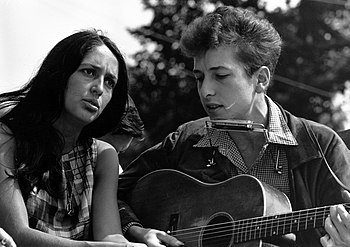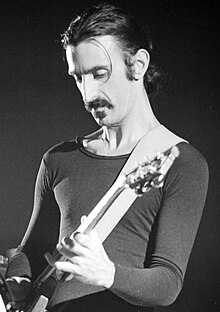Portal:1960s
The 1960s Portal
The 1960s became synonymous with the new, radical, and subversive events and trends of the period. In Africa the 1960s was a period of radical political change as 32 countries gained independence from their European colonial rulers. Some commentators have seen in this era a classical Jungian nightmare cycle, where a rigid culture, unable to contain the demands for greater individual freedom, broke free of the social constraints of the previous age through extreme deviation from the norm. Christopher Booker charts the rise, success, fall/nightmare and explosion in the London scene of the 1960s. However, this alone does not explain the mass nature of the phenomenon. Several nations such as the U.S., France, Germany and Britain turned to the left in the early and mid 1960s. In the United States, John F. Kennedy, a Keynesian and staunch anti-communist, pushed for social reforms. His assassination in 1963 was a stunning shock. Liberal reforms were finally passed under Lyndon B. Johnson including civil rights for African Americans and healthcare for the elderly and the poor. Despite his large-scale Great Society programs, Johnson was increasingly reviled by the New Left at home and abroad. The heavy-handed American role in the Vietnam War outraged student protestors across the globe, as they found peasant rebellion typified by Ho Chi Minh and Che Guevara more appealing. Italy formed its first left-of-center government in March 1962 with a coalition of Christian Democrats, Social Democrats, and moderate Republicans. Socialists joined the ruling block in December 1963. In Britain, the Labour Party gained power in 1964. In Brazil, João Goulart became president after Jânio Quadros resigned. This is a Featured article, which represents some of the best content on English Wikipedia..
Sgt. Pepper's Lonely Hearts Club Band is the eighth studio album by the English rock band the Beatles. Released on 26 May 1967, Sgt. Pepper is regarded by musicologists as an early concept album that advanced the roles of sound composition, extended form, psychedelic imagery, record sleeves, and the producer in popular music. The album had an immediate cross-generational impact and was associated with numerous touchstones of the era's youth culture, such as fashion, drugs, mysticism, and a sense of optimism and empowerment. Critics lauded the album for its innovations in songwriting, production and graphic design, for bridging a cultural divide between popular music and high art, and for reflecting the interests of contemporary youth and the counterculture. At the end of August 1966, the Beatles had permanently retired from touring and pursued individual interests for the next three months. During a return flight to London in November, Paul McCartney had an idea for a song involving an Edwardian military band that formed the impetus of the Sgt. Pepper concept. For this project, they continued the technological experimentation marked by their previous album, Revolver (1966), this time without an absolute deadline for completion. Sessions began on 24 November at EMI Studios with compositions inspired by the Beatles' youth, but after pressure from EMI, the songs "Strawberry Fields Forever" and "Penny Lane" were released as a double A-side single in February 1967 and left off the LP. The album was then loosely conceptualised as a performance by the fictional Sgt. Pepper band, an idea that was conceived after recording the title track. (Full article...)This is a Good article, an article that meets a core set of high editorial standards.
The English rock group the Beatles toured West Germany, Japan and the Philippines between 24 June and 4 July 1966. The thirteen concerts comprised the first stage of a world tour that ended with the band's final tour of the United States, in August 1966. The shows in West Germany represented a return to the country where the Beatles had developed as a group before achieving fame in 1963. The return flight from the Philippines to England included a stopover in Delhi, India. There, the Beatles indulged in two days of sightseeing and shopping for musical instruments while still under the attention of the press and local fans. The concerts were well attended yet provided the band with little in the way of artistic fulfilment. The programme was in the package-tour format typical of the 1960s, with two shows per day, several support acts on the bill and the Beatles' set lasting around 30 minutes. The band's setlist included their new single, "Paperback Writer", but no songs from their recently completed album, Revolver. Often marked by poor playing, the shows highlighted the division between what the group could achieve when performing live as a four-piece with inadequate amplification and the more complex music they were able to create in the recording studio. Concerts at the Circus-Krone-Bau in Munich and the Nippon Budokan hall in Tokyo were filmed and broadcast on local television networks. (Full article...)Selected picture - American folk singers Joan Baez and Bob Dylan, performing a duet at the March on Washington for Jobs and Freedom on August 28, 1963. Both were relatively new recording artists at the time, with Baez being at the forefront of American roots revival and Dylan having just released his second album. Baez was especially influential in introducing audiences to Dylan's music by recording several of his early songs and inviting him onstage during her own concerts.
Did you know -
Related portalsThis is a Featured article, which represents some of the best content on English Wikipedia..
Frank Vincent Zappa (/ˈzæpə/ ZAP-ə; December 21, 1940 – December 4, 1993) was an American musician, composer, and bandleader. In a career spanning more than 30 years, Zappa composed rock, pop, jazz, jazz fusion, orchestral and musique concrète works; he also produced almost all of the 60-plus albums that he released with his band the Mothers of Invention and as a solo artist. His work is characterized by nonconformity, improvisation sound experimentation, musical virtuosity and satire of American culture. Zappa also directed feature-length films and music videos, and designed album covers. He is considered one of the most innovative and stylistically diverse musicians of his generation. As a mostly self-taught composer and performer, Zappa had diverse musical influences that led him to create music that was sometimes difficult to categorize. While in his teens, he acquired a taste for 20th-century classical modernism, African-American rhythm and blues, and doo-wop music. He began writing classical music in high school, while simultaneously playing drums in rhythm and blues bands, later switching to electric guitar. His debut studio album with the Mothers of Invention, Freak Out! (1966), combined satirical but seemingly conventional rock and roll songs with extended sound collages. He continued this eclectic and experimental approach throughout his career. (Full article...)This is a Good article, an article that meets a core set of high editorial standards.
Keith Richards (born 18 December 1943) is an English musician, songwriter, singer and record producer who is an original member, guitarist, secondary vocalist, and co-principal songwriter of the Rolling Stones. His songwriting partnership with the band's lead vocalist Mick Jagger is one of the most successful in history. His career spans over six decades, and his guitar playing style has been a trademark of the Rolling Stones throughout the band's career. Richards gained press notoriety for his romantic involvements and illicit drug use, and he was often portrayed as a countercultural figure. First professionally known as Keith Richard, by the early 1970s he had fully asserted his family name. Richards was born in and grew up in Dartford, Kent. He studied at the Dartford Technical School and Sidcup Art College. After graduating, Richards befriended Jagger, Bill Wyman, Charlie Watts, Ian Stewart and Brian Jones and joined the Rolling Stones. As a member of the Rolling Stones, Richards also sings lead on some Stones songs. Richards typically sings lead on at least one song a concert, including "Happy", "Before They Make Me Run", and "Connection". Outside of his career with the Rolling Stones, Richards has also played with his own side-project, The X-Pensive Winos. He also appeared in two Pirates of the Caribbean films as Captain Teague, father of Jack Sparrow, whose look and characterisation was inspired by Richards himself. (Full article...)Selected article -The 1968 Winter Olympics, officially known as the X Olympic Winter Games (French: Les Xes Jeux olympiques d'hiver), were a winter multi-sport event held from 6 to 18 February 1968 in Grenoble, France. Thirty-seven countries participated. Frenchman Jean-Claude Killy won three gold medals in all the alpine skiing events. The 1968 Winter Games marked the first time the IOC permitted East and West Germany to enter separately, and the first time the IOC ordered drug and gender testing of competitors. (Full article...)More Did you know (auto generated)
TopicsCategoriesWikiProjects
Associated WikimediaThe following Wikimedia Foundation sister projects provide more on this subject:
Discover Wikipedia using portals |





























